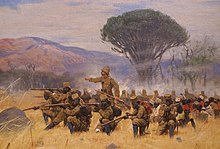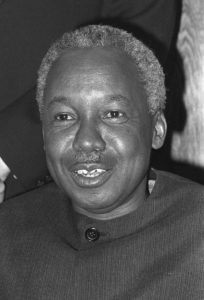

Tanzania
In the late 19th century, Germany conquered the regions that are now Tanzania (minus Zanzibar) and incorporated them into German East Africa (GEA). The Supreme Council of the 1919 Paris Peace Conference awarded all of GEA to Britain on 7 May 1919, over the strenuous objections of Belgium. The British colonial secretary, Alfred Milner, and Belgium’s minister plenipotentiary to the conference, Pierre Orts , then negotiated the Anglo-Belgian agreement of 30 May 1919 where Britain ceded the north-western GEA provinces of Ruanda and Urundi to Belgium. The conference’s Commission on Mandates ratified this agreement on 16 July 1919. The Supreme Council accepted the agreement on 7 August 1919. On 12 July 1919, the Commission on Mandates agreed that the small Kionga Triangle south of the Rovuma River would be given to Portuguese Mozambique, with it eventually becoming part of independent Mozambique. The commission reasoned that Germany had virtually forced Portugal to cede the triangle in 1894. The Treaty of Versailles was signed on 28 June 1919, although the treaty did not take effect until 10 January 1920. On that date, the GEA was transferred officially to Britain, Belgium, and Portugal. Also on that date, “Tanganyika” became the name of the British territory.
During World War II, about 100,000 people from Tanganyika joined the Allied forces and were among the 375,000 Africans who fought with those forces. Tanganyikans fought in units of the King’s African Rifles during the East African Campaign in Somalia and Abyssinia against the Italians, in Madagascar against the Vichy French during the Madagascar Campaign, and in Burma against the Japanese during the Burma Campaign. Tanganyika was an important source of food during this war, and its export income increased greatly compared to the pre-war years of the Great Depression. Wartime demand, however, caused increased commodity prices and massive inflation within the colony.

In 1954, Julius Nyerere transformed an organization into the politically oriented Tanganyika African National Union (TANU). TANU’s main objective was to achieve national sovereignty for Tanganyika. A campaign to register new members was launched, and within a year, TANU had become the leading political organisation in the country. Nyerere became Minister of British-administered Tanganyika in 1960 and continued as prime minister when Tanganyika became independent in 1961.[49]
Modern:
British rule came to an end on 9 December 1961, but for the first year of independence, Tanganyika had a governor general who represented the British monarch. Tanganyika also joined the British Commonwealth in 1961. On 9 December 1962, Tanganyika became a democratic republic under an executive president.
After the Zanzibar Revolution overthrew the Arab dynasty in neighboring Zanzibar, accompanied with the slaughter of thousands of Arab Zanzibarians, which had become independent in 1963, the archipelago merged with mainland Tanganyika on 26 April 1964. The new country was then named the United Republic of Tanganyika and Zanzibar. On 29 October of the same year, the country was renamed the United Republic of Tanzania (“Tan” comes from Tanganyika and “Zan” from Zanzibar). The union of the two hitherto separate regions was controversial among many Zanzibaris (even those sympathetic to the revolution) but was accepted by both the Nyerere government and the Revolutionary Government of Zanzibar owing to shared political values and goals.
Following Tanganyika’s independence and unification with Zanzibar leading to the state of Tanzania, President Nyerere emphazised a need to construct a national identity for the citizens of the new country. To achieve this, Nyerere provided what is regarded as one of the most successful cases of ethnic repression and identity transformation in Africa. With over 130 languages spoken within its territory, Tanzania is one of the most ethnically diverse countries in Africa. Despite this obstacle, ethnic divisions remained rare in Tanzania when compared to the rest of the continent, notably its immediate neighbor, Kenya. Furthermore, since its independence, Tanzania has displayed more political stability than most African countries, particularly due to Nyerere’s ethnic repression methods.